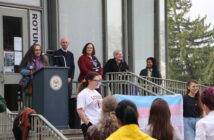When I heard Jon Stewart was returning from his nine-year hiatus to host “The Daily Show” through the 2024 presidential election, I celebrated as if I had just been accepted into grad school. This was the man I saw give a tearful testimony to a mostly empty Congress in 2019, imploring them to give aid to the 9/11 first responders dying preventable deaths, and the man I saw call out the inflammatory, partisan nature of the CNN show “Crossfire” to the hosts faces so convincingly that the segment was canceled shortly thereafter.
Surely, if there was anyone who could cogently address the structural issues that led to the geriatric dumpster fire of an election that is the Trump-Biden rematch, it would be him.
After watching his first episode back, though, I have mixed feelings. Stewart’s 20-minute-long desk monologue covers the candidates’ ages in a way that is more nuanced than the typical conversation you hear on cable news, while also stopping short of any takeaway deeper than “they’re both old and they both suck, but Biden’s still a better choice.”
After opening the monologue to a standing ovation, Stewart begins to dig into the Special Counsel report that characterizes President Biden as a “well-meaning elderly man with a poor memory.” He then quips about how difficult it must be to watch a president be unable to remember basic facts before playing a compilation of Trump being unable to remember basic facts.
This was the pattern that characterized much of the monologue: criticize Trump, criticize Biden for balance, criticize them both at the same time and move back to criticizing Trump. While the jokes (that I won’t waste space butchering) were funny and the points (that I won’t waste space boring you with) were well put, there was an enduring feeling that Stewart was running in circles around deeper questions without stopping to articulate them.
Why do we have this rematch to begin with? What structural forces turned this nightmare into an unavoidable reality so early in the election process? Stewart does not address these questions, which is surprising partially because he has never been shy to speak on points outside the political zeitgeist, but mostly because these are the questions one could assume to be on the mind of a left-of-liberal political talk show host who has made a career out of addressing the forest while established media entities look to the trees.
This is not to say that Stewart was completely devoid of poignant political analysis. Toward the end of his monologue, he discusses how many on the left who are unsatisfied with President Biden are being urged to vote for him anyway because, though he’s not great, he’s a better choice than Trump. “What’s crazy is thinking that we’re the ones, as voters, who must silence concerns and criticism. It is the candidate’s job to assuage concerns, not the voters’ job.”
Unfortunately, this is where Stewart’s argument ends. He finishes off the monologue by saying that, although Nov. 5th may seem like the most important political date of the year, Nov. 6th and the days that follow “aren’t something to sneeze at.” Changing this country for the better, Stewart says, is a thankless job that requires constant work every day. We don’t just have to worry about Election Day, we have to worry about every day before and every day after. Forever.
There is no mention of the various third-party candidates vying for space in the media landscape or the duopolistic nature of the two-party system that forces us to accept these candidates without giving voters an opportunity to look into other options.
These omissions become even more disappointing when reporter and occasional host Jordan Klepper calls Stewart out for them in the very next segment, only to be played for laughs.
Perhaps I am not being charitable enough to Stewart and “The Daily Show’s” writers here. It is almost impossible to capture every angle of a national election in a single episode of network television. Time constraints and network censors water down even the strongest pieces of political commentary into marketable lines designed to garner applause. It is a testament to Stewart’s power in the political landscape that I have come to expect so much from him over the nine years that his voice has been noticeably absent.
In the weeks since the first episode, Stewart has stepped back from election coverage to focus on a variety of political issues from Tucker Carlson’s interview with Vladimir Putin to Israel’s conduct in Gaza. It’s to be expected that a show dedicated to national politics needs to focus on many different topics, but I can’t say that I’m not disappointed that Stewart has yet to aim a critical lens at the institutions that precipitate many of the issues that drive “The Daily Show.”
Stewart will be returning over the next nine months to continue to call out the absurdities of American politics, through his unique brand of snarky witticisms undercut with serious conversation. There is still time for him to use his platform to address deeper structural issues. I will be waiting with bated breath to see what he does.






Comment policy
Comments posted to The Brown and White website are reviewed by a moderator before being approved. Incendiary speech or harassing language, including comments targeted at individuals, may be deemed unacceptable and not published. Spam and other soliciting will also be declined.
The Brown and White also reserves the right to not publish entirely anonymous comments.